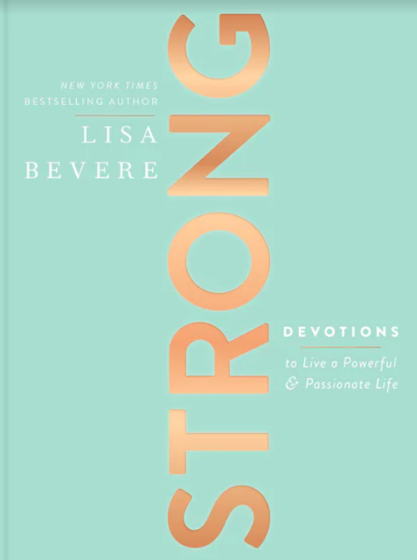When You Are Broken, God Can Make You Strong: Lisa Bevere & Kurt Angle
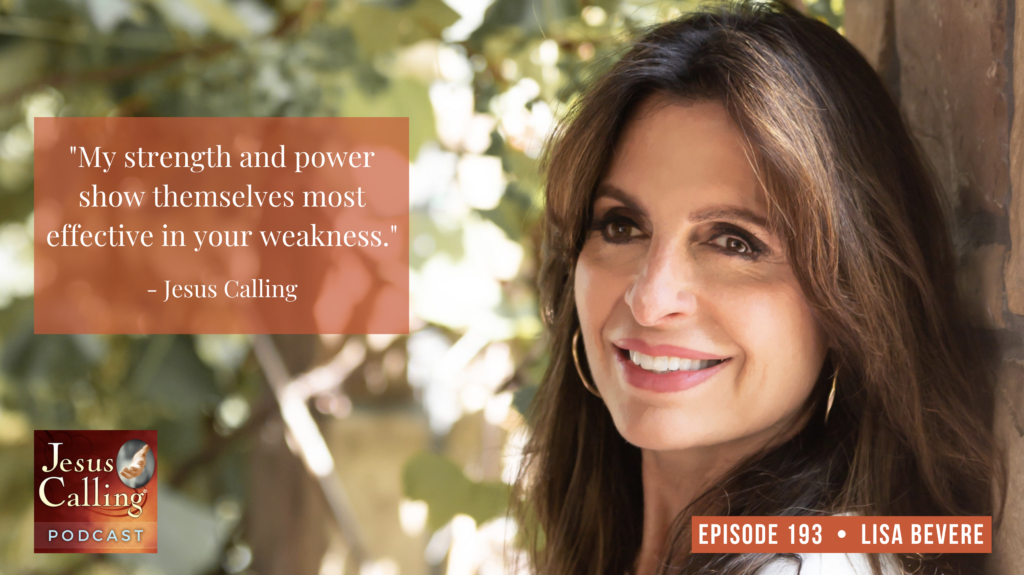
Narrator: Fill Easter baskets this year with the adorable children’s book, Jesus Calling: The Story of Easter! You can find Jesus Calling: The Story of Easter on special at Books-A-Million.com.
Lisa Bevere: You know, I think it’s so fascinating that God is strong. But a lot of times women think, Okay, but strong is wrong because we have actually associated strength with the things that would be ungodly: anger, punishment, rebellion. But strength is actually this incredibly beautiful expression of God in our life, and a lot of times women do not understand that being strong is not wrong for them. You not only have the right, but you also have permission from God to be strong.
When You Are Broken, God Can Make You Strong: Lisa Bevere & Kurt Angle – Episode #193
Narrator: Welcome to the Jesus Calling Podcast. Our guests this week have had to discover where their strength lies, and both have concluded it comes from seeking God: writer and speaker Lisa Bevere and former WWE Wrestler Kurt Angle.
Lisa Bevere’s mission is to lift up women no matter where they are and remind them of the God-given strength they have right now, which she talks about in her new book, Strong. But Lisa didn’t always have a heart for women—she feared being wounded by them, the way her mother had unknowingly wounded her as a child. God showed Lisa how He can use our weakness to show His strength, and Lisa went on to mentor thousands of young women in her ministry.
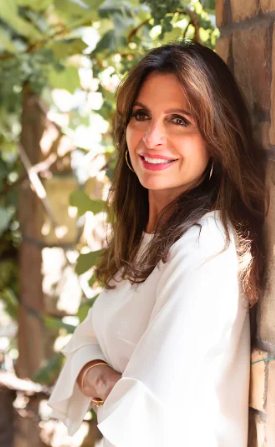
Lisa Bevere: I’m Lisa Bevere. I am a mother to four men, a grandmother to four, and in so many ways, I hope, a godmother to thousands. I have such a heart to see women empowered, to be strong, and to understand they don’t have to take their strength from somebody else—they get their strength from God.
“I have such a heart to see women empowered, to be strong, and to understand they don’t have to take their strength from somebody else—they get their strength from God.” – Lisa Bevere
Lisa’s Road to Mentorship
When I was a young girl, I had become a Christian at twenty-one years of age, and then I got married, and I just did not know. I thought I need help. I think I’m a crazy person. I don’t know how to be a mother. I don’t know how to be a wife. I haven’t had any of this modeled well for me. And everywhere I turned, I’d see this pastor’s wife or that pastor’s wife, and I thought, Maybe they will think I’m worthy of their attention. Maybe they will say, ‘Okay, Lisa, I can see your struggling here. Let me help you. Let me lift you.’ And for eight years, I looked for that woman.
I remember my husband tricking me into doing a women’s meeting. I said, “Hey, wait a minute. I feel like women have this weird language where they don’t say what they mean. They don’t mean what they say. I don’t want to be associated with that.”
And so I got on my knees, and I was like, “God, I’ve asked for you to send me a woman who would love me and pour into me, and You haven’t done it. So I am not going to actually be able to minister to women. I don’t like them.”
You know, there was a reason why I didn’t like women. It wasn’t that I hated being a woman. It was that I felt both wounded and vulnerable as a woman. My mother had not gotten what she needed from her mother, and because she had not gotten what she needed from her mother, I didn’t get what I needed from my mother, and I felt so ill-equipped to actually be a mother to daughters.
And I heard the Spirit of God say, “I like them. I love women.” He said, “Now, Lisa, I know you wish a woman would have been that answer to you, but that’s not going to happen. I’m going to ask you to be that woman for other women—that woman that would have noticed, that woman that would have spoken into your life. I want you to be that woman.”
And I remember feeling so inadequate. I said, “I can’t be that woman. I don’t even know what that looks like.”
And He said, “Yeah, you actually do. Begin to write it backward. Everything that you wish another woman would have been to you, you begin to be.”
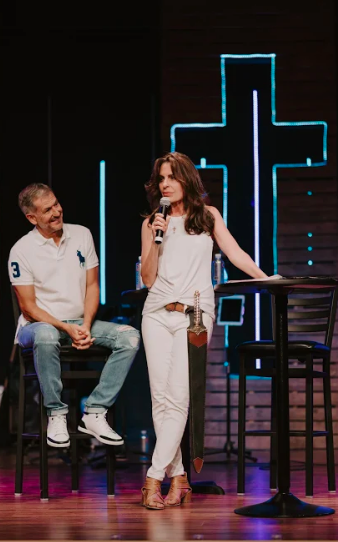
So I sat down with pen and paper, and I said, “This is what she would look like when she saw me. I wouldn’t see disapproval. I would see welcome, I wouldn’t see criticism. I would see somebody that would say, ‘I’m here to come alongside.’ She would speak from her experience. She wouldn’t make her life look perfect, she would open it up, and then she would show me the things that were hard for her, but she would also give me a pathway out. She would be vulnerable and strong.”
And I just remember writing those things out, and then God said, “I don’t want a mentoring of pride. I want mentoring of brokenness. I want you to pour out of your longing because this is what is going to actually bring healing.”
“Then God said,‘I don’t want a mentoring of pride. I want mentoring of brokenness. I want you to pour out of your longing, because this is what is going to actually bring healing.’” – Lisa Bevere
It was shocking to me to see how desperate young women are for mothers, and it’s still very shocking to me that my number-one demographic is young women. It is the women who are 24 to 35. They are the same age as my children. They are saying, “Do you see us? Can you help us? Can you walk alongside us?” And I love that I’m having this chance to revisit it again in my season [as a] grandmother, to actually say to these moms, “I’m watching for you and I want you to be strong.”
What is Strong?
I am so excited about my new book, Strong.
So “strong” is actually leaning into a deep work of God in your life, and then letting that deep purpose actually gain expression. When we think in the back of our mind that being a woman is a weakness, being a woman is a problem, when we think, I could be more powerful if I was a man, then we’re actually buying into the enemy’s lie, and we’re devaluing who God created us to be.
“When we think in the back of our mind that being a woman is a weakness, being a woman is a problem, when we think, I could be more powerful if I was a man, then we’re actually buying into the enemy’s lie, and we’re devaluing who God created us to be.” – Lisa Bevere
Years ago, I wrote a book called Lioness Arising. And I found in a lioness this expression of who women are. They are at once fierce and nurturing. God actually compares Himself to a female lion and a mother bear, which I just think is amazing.
And so we have this incredible capacity of protection. We say, “Hey, hey, hey, this is not right.” When you become a mother, I don’t know what happens, but all of a sudden [for me], there was a protectiveness that was in my life that had never been there before. And I think that we have a generation that has confused some of this incredible nurture to be a weakness, when God is saying “Oh, no, no, no. That is actually how I am.”
From Hurt to Healing
I was ministering last weekend, and somebody said, “Oh yeah Lisa, Miss Perfect Family.” And you know, I don’t think that I’ve ever done it perfectly, and I don’t think my husband has ever done it perfectly, and I don’t think my children have done it perfectly. But I will say we have done it well, which means when we’ve made mistakes, we were healthy enough to admit it and grow from it.
You know, for many, many years, anger played a destructive role in my life. I would make this whole list of excuses. I would say, “Hey listen, I was born angry. I’m half Sicilian, my parents were divorced and remarried and divorced again. I lost an eye.” I had this incredible resumé on why I could be angry and sin.
Now the Bible is really clear, but we don’t often know how to do this, “Be angry and sin not.” And I thought I don’t know how to do both of those. I know how to, in my anger, sin. I know how, in my anger, to call my husband names.
And what happened was my anger went immediately to rage. I didn’t know how to do the, “I’m upset. I’m going to step back so that we can sit down together.” What I did is I attacked people instead of problems. I attacked character instead of the crisis.
“I didn’t know how to do the, “I’m upset. I’m going to step back so that we can sit down together.” What I did is I attacked people instead of problems. I attacked character instead of the crisis.” – Lisa Bevere, on her struggle with anger
But I had a crisis when I had my second child, which was a wake-up call. See, we will continue to repeat a pattern of rage until it actually becomes too costly, and with my second son, this became too costly because I found myself now a stay-home mom.
Now I’m staying home, and I’m feeling like a failure. My house is a mess. Every day, my husband comes home after taking the only car we had—so I was trapped—and asking me, “What have you done all day?” And I would look at the house. I would look at myself. I would think, Yeah, you’re right. I am a hot mess. I have done nothing. I can’t say one thing I’ve done. I’ve brushed my teeth. That’s about it. And I’ve nursed a baby.
And one day, I just snapped.
My son, who I had put down maybe an hour earlier, kept coming off his bed, coming off his bed, coming off his bed, and I went storming up the stairs. I grabbed my two-year-old son—he might have been three at that time. And it was like I had a storm in my brain, a storm in my body. God did something so merciful for me. I had lifted my son up to eye level, and I was just about ready to slam him to the wall when I saw something I’d never seen before. My son was not afraid of what I was going to do because I’d never done anything like that. He was afraid of me.
And when I saw the fear of me in my son’s eyes, it broke me. And I remembered my own fear and terror as a young child. Well, I grew up emotionally and physically abused by my mother, and every time she would slap, every time she would kick, every time she shoved me into a wall, I made myself a promise and it went like this: “I will never treat my children this way.” That was how I had comfort. And then there I was a born-again pastor’s wife, getting ready to hurt my son. And it utterly and completely broke me.
I put him down, and I said, “Addison, I’m so sorry. I’m so sorry I scared you.” And I went downstairs, I hit the carpet, and I wept like a baby until there was nothing left.
And in the stillness, I heard the Spirit of God say, “Because you’re no longer justifying this, I’ll take it out of your life.” See, what we justify, we buy. We say, “We’ve earned the right to be this way because of what’s been done to us.” And there are a whole lot of reasons that people can give on why they’re broken, why they are wounded, why they are hurt. And I have so much compassion for that, but I have good news: what Jesus did for you is more powerful than what anybody did to you. And that moment came into a realization for me. I forgave my mother. I called my mother. I repeated what had almost happened, and I asked her to forgive me for not forgiving her of a very similar incident. And she began to weep.
“There are a whole lot of reasons that people can give on why they’re broken, why they are wounded, why they are hurt. And I have so much compassion for that, but I have good news: what Jesus did for you is more powerful than what anybody did to you.” – Lisa Bevere
And then, I was of course forgiven when I confessed my sin to God. He forgives us. You know, it’s not like He found out about it when I confessed it. He forgives us, but I was healed when I confessed it to my mother. And then when my husband came home from work, I told John what almost happened, and it gave me accountability to break an unhealthy habit. It was the turning point, but then I had to change the pattern. And you know, it took about four or five weeks, but that pattern in my life was broken, and as we know to do better, we do better.
Finding Real Friends
Friendships have always been a difficult thing for me, and I’ve done it well and I have not done it well in the past. But friendships are too important not to develop.
And so I’ve had to learn what I’m actually looking for in a friendship, and a real friend cares more about the other person than even maybe the maintenance of the relationship. They speak the truth, but they speak the truth in love. They do not gossip about you. They protect you. They’re not jealous or envious of you, but they actually want to see you grow into everything that God has on your life and for your life. They’re going to cover when you mess up, but they’re going to confront if there’s a breach in your relationship.
”I think it’s important for women to have friendships with women that are older than them, women that are their same age and in the same season, and then women who are younger.” – Lisa Bevere
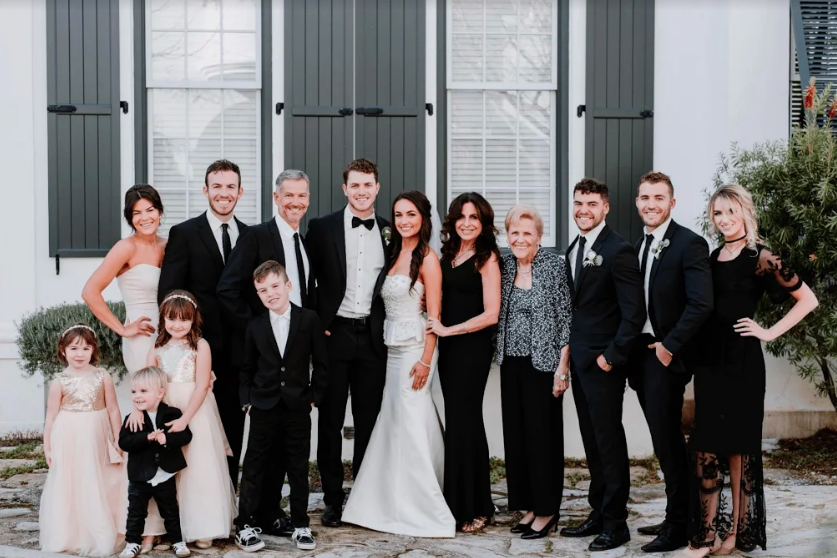
Probably my most fulfilling female relationships are not with my peers, or even with the women over me. It’s actually been my connections with the women younger than me. It’s when you actually feel like you have something of value to add to their life.
Friends, true friends, lift each other, and to be honest with you, at my age—I’m fifty-nine, my next birthday I’ll be sixty—feeling like at my age I have this ability to mark a trail for others to walk on is hugely important. And I think that God is looking to this whole generation and saying, “Baby girl, get in my presence. I have things I want to whisper over your soul.” And I love that Jesus Calling models that.
I absolutely love this devotion from Jesus Calling, November 2nd:
GROW STRONG in the Light of My Presence. Your weakness does not repel Me. On the contrary, it attracts My Power, which is always available to flow into a yielded heart. Do not condemn yourself for your constant need of help. Instead, come to Me with your gaping neediness; let the Light of My Love fill you. A yielded heart does not whine or rebel when the going gets rough. It musters the courage to thank Me even during the hard times. Yielding yourself to My will is ultimately an act of trust. In quietness and trust is your strength.
Okay, I love that passage, because this is the tone that I find that God has always spoken to me in. He always says, “Lisa, it isn’t in your weakness that I show myself strong. I’m not going to anoint the areas where you are already strong, and you think, ‘I don’t need you.’ I want to anoint the areas where you are broken and where you are afraid, where I can show myself strong.”
Too many people think that God has somehow gone mute, and yet Jesus still speaks. He speaks love. He speaks redemption. He says, “I do not condemn.” He says, “I am your light. You don’t have to walk in the realm of shadow anymore. Get out of your shame.”
“Too many people think that God has somehow gone mute, and yet Jesus still speaks. He speaks love. He speaks redemption. He says, “I do not condemn.” He says, “I am your light. You don’t have to walk in the realm of shadow anymore.” – Lisa Bevere
I never knew that the day would come where I would be able to translate strength for another generation. But that is what Strong is all about: one generation telling the next generation of the faithfulness of God.
Narrator: Lisa’s new book, Strong, is available wherever books are sold.
Stay tuned to Kurt Angle’s story after a brief message about a beautiful new edition of Jesus Calling that’s a perfect way to celebrate the Easter season.

Narrator: The Easter season is filled with joy and hope. Now, there’s a new way to focus on the holiday with the new book, Jesus Calling® for Easter. With 50 Jesus Calling devotions selected just for the Lent and Easter season, Jesus Calling for Easter includes Scripture verses alongside breathtaking imagery and exquisite design. Jesus Calling for Easter makes a stunning gift for those who love Jesus Calling and would like a new way to observe the Easter season. To learn more about this beautiful new edition of Jesus Calling, please visit jesuscalling.com/books.
Narrator: Our next guest is former WWE wrestler and Olympic champion Kurt Angle. Kurt was in the business of being strong—and became a formidable presence in the wrestling world. He captured national attention in 1996 when he won the 220-pound freestyle wrestling competition at the Olympic Games in Atlanta with a broken neck. Four years after earning Olympic gold, Angle joined the WWE and became one of its most prominent figures. But behind the powerful facade was a man who struggled with addiction, just as his father did—and soon Kurt found out that his own strength would not be enough to stop his life from spiraling—he needed God’s help.
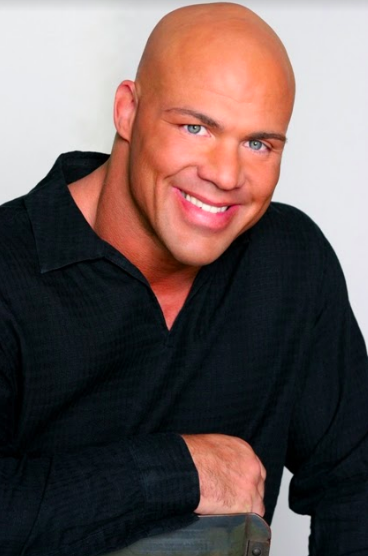
Kurt Angle: I’m Kurt Angle—1996 Olympic gold medalist, six-time WWE world heavyweight champion and thirteen-time world champion.
Fond Memories of a Sports Family
My fondest memories were playing sports. My family was very dedicated to athletics. It was the thing that we talked about at the dinner table. That’s what we watched on TV. It’s what we did every day. And if you weren’t a great athlete in the Angle family, you weren’t very important. So it was the one thing that I clung to when I was a very little kid. I wanted to be the best at something. And I found my true love, and that was wrestling.
When I started wrestling, I was very young, but I wasn’t very good at it and I didn’t like it. My brothers were all wrestlers, and they competed in high school and went to college and they did fairly well. I, on the other hand, liked team sports when I was younger. I didn’t feel the pressure as much as when you’re the only individual out there and everybody’s eyes are on you. I was more clinging to baseball, football, basketball because I knew that it didn’t rely solely on me.
I had to get over that fear eventually. And I did. It probably started in junior high. Well, when I was younger, I lost quite a bit. I didn’t like the feeling. I wanted to be as good as my brothers, and I wasn’t. It was very difficult for me to accept at the time, but what happened was I continued to watch them and I would study what they did and I would mimic them and I would copy them. And my brothers are all great athletes. And I knew that if I kept at it, something eventually good would happen.
Kurt Loses His Father
My dad was a very good father. Obviously, sports were very important to him. You know, he didn’t want you to fail out of school, [but] I would say education was second to sports.
He was very responsible. As far as providing for us. But he did have a problem—he was an alcoholic. He did it all day, every day.
The great thing about my dad was he never missed a sporting event. He would go straight from work to whatever event we had, and he would watch it. He worked all day, he’d watch sporting events, and then he would go home, drink, and pass out. This was a daily thing. I saw this as a child.
I didn’t really get to spend a lot of time with him. When I was fifteen years old, my father died in a construction accident. I didn’t really know my dad. My dad wasn’t very affectionate. He was quiet. He was to himself. One thing I did think about was, I don’t want to become that guy. And, you know, twenty-five years later, I was much of the same guy, my father in every aspect.
“One thing I did think about was, I don’t want to become that guy. And, you know, twenty-five years later, I was much of the same guy, my father in every aspect.” – Kurt Angle, on his father
Following in His Father Footsteps: The Good and The Bad
When I say I copied my dad in every aspect, I really did. My dad went to church every week. My dad prayed quite a bit. My father had a relationship with Jesus Christ. He did it in a way that said, “Hey, God, you and I are cool, so when I do this little thing on the side, let me have this. And I’ll stay true to You every step of the way.”
I made that deal, too. I had this love affair on the side with alcohol and drugs. And I also had my relationship with God, but I never mixed it. So I was like, “God, I’m going to turn off right now. I’m going to go to my drinking and my drugs and I’ll get back to You in a few hours.”
“I had this love affair on the side with alcohol and drugs. And I also had my relationship with God, but I never mixed it. So I was like, “God, I’m going to turn off right now. I’m going to go to my drinking and my drugs and I’ll get back to You in a few hours.’” – Kurt Angle
I broke my neck in 2003, the second time. The first time was in 1996, right before the Olympics, I broke my neck.
It sounds crazy, but I knew that I would sacrifice anything to be out there and compete. So the first thing I had to do was—when you have a broken neck, you have disks in your neck sticking into your vertebrae, it’s hard to get a doctor to clear you for wrestling. So I had to convince a doctor to clear me with my vertebrae being broken and my discs being stuck into my spinal cord.
So I did find a doctor, and that doctor gave me a healing agent that probably did a limited amount of things, but it probably did help with the healing. But at the same time, he would stick me with ten or twelve different shots of novocaine in my neck. So when I would go out there, I literally couldn’t feel it. But I felt it an hour later, I was in excruciating pain. But during that certain match, every match, I couldn’t feel my neck, so it wasn’t that difficult to overcome.
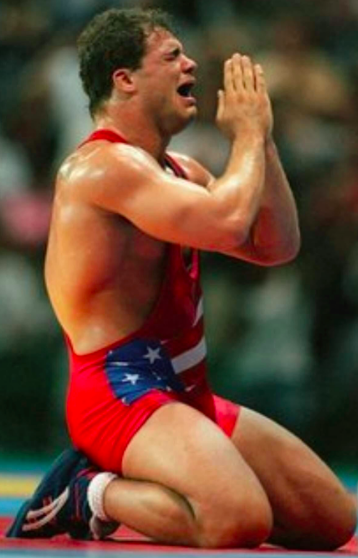
And I never looked at it from a long-term standpoint. Am I damaging my neck long term? I didn’t care. I was in the Olympics, and this is all I ever wanted to do. And I knew if I didn’t compete in the Olympics in ‘96, I wasn’t guaranteed to make it 2000. So I decided that I was going to do it, whether it killed me or not, whether I became a paraplegic or not.
I was the guy with the X on him, and I was the guy to beat. So I knew that I had to be ten times better, and I was that year. I did it. I won. I did what I had to do. A lot of people wanted me to continue to wrestle. I was going to get a big shoe deal with Nike if I continued. But here I was with a broken neck, and I just won the gold [at the Olympics], and won the World’s. I wanted to just get away from it. It was too much for me.
If I didn’t have God in my life, I would have been overwhelmed. I just put way too much pressure on myself. And I didn’t like that feeling, so I had to get away from it.
I was introduced to painkillers. I didn’t even know what they were, and I started taking them. I got hooked right away. You know, one wasn’t enough, and then I went to two, and then two went to four. And my body built a tolerance, so I had to keep doubling and keep taking it, and I got to the point where I took 65 extra-strength Vicodin in a day.
I was out of control. I didn’t know how to handle it. I tried to hide it. Even though I was probably high half the time, and I probably felt I was hiding it well, but I probably wasn’t.
The alcohol didn’t come in until I got over the painkillers and I wanted that high feeling again. But I didn’t want to go there, because I didn’t want to go through the withdrawal and everything that occurs with taking painkillers. So I started taking Xanax, and I started drinking. It was two beers and three, then twelve.
So, you know, I started mixing different drugs and trying to get my high feeling after I got done with work every day. So it was something that I had to do that I remember my dad was doing when I was growing up. I was copying what my father did.
I was doing this for a good seven years. It wasn’t until 2013 that I decided to get clean, and that’s because my wife was going to leave me. She said, “I can’t do this anymore, and I don’t want your money. I just want to live a life without drugs or alcohol. I want to live happily. And I’m not happy because you’re not here.”
I didn’t really realize that until I got into rehab. And when I learned about my disease, and I learned about how it can affect other people, I didn’t realize how selfish I was. And so going to rehab was the first step.
When I got into rehab, first of all, I thought I was going just for alcohol, and I was taking morphine and Xanax and muscle relaxers. I thought I was just going into rehab for alcohol, and I thought I could hide the other stuff. And they said, “You can’t bring that in here with you.”
I said, “Well, they’re prescribed to me.”
They said, “It doesn’t matter.”
So I knew I was letting it all go. I was terrified every day. The one thing I worried about is, What if I end up a screwup? What if I can’t stay clean?
So every day in rehab, I kept praying, “God, please, I don’t want to be a screwup. I don’t want to come out of here and go back to where I was. I want to progress. I want to move forward.” And I prayed every day. I prayed quite a bit. And I continued to pray because it’s not easy staying clean. But I’ve been clean and sober for almost six years now, and I haven’t had any problems. So my life has changed dramatically because of my relationship with Jesus Christ, because I gave myself to Him entirely, rather than a portion of me.
“So every day in rehab, I kept praying, ‘God, please, I don’t want to be a screw up. I don’t want to come out of here and go back to where I was. I want to progress. I want to move forward.’” – Kurt Angle
The Hard Life of Professional Wrestling
I never watched wrestling. The only people I knew were Bruno San Martino because he’s from Pittsburgh, I knew Hulk Hogan and Andre the Giant. That’s it. They were just bigger-than-life characters that everybody knew about. So it was a very sobering year for me when I signed because I had to educate myself on what was going on and learn about the best wrestlers of that era, like Stone Cold, Steve Austin, The Rock who? I’d wrestle against them for world titles and beat them both for the world championship.
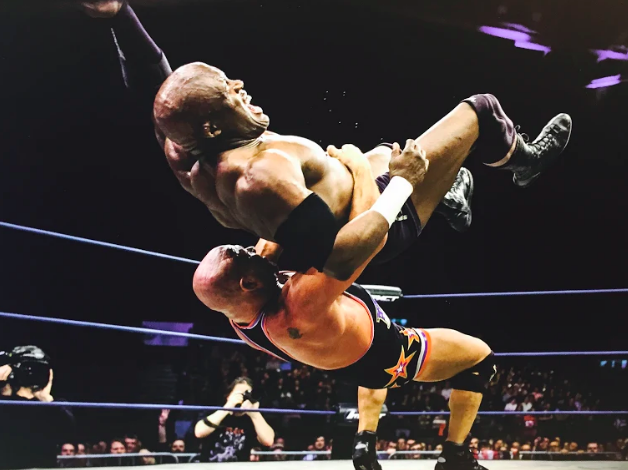
The problem is you wrestle probably 300 days a year. You’re in a different city every day. You travel throughout the world. That’s hard enough as it is. It’s not easy flying to a city, going to the gym, working out. Hurry up, get to the arena, do your match, then travel five hours to the next city and then sleep for six hours and get up and do the same thing. And you just keep doing it over and over and over. It wasn’t easy.
My career has gone up and down, a lot of roller coasters. What keeps me rooted? Being reliable for my kids. You know, it’s crazy because I want to be a person that my kids look up to, and that they say, “You know what? Dad’s a good dad, and he’s a good person.”
“I’m always changing and always asking, ‘What’s the next step for me? Where do I go from here and how do I make it?’ And, you know, a lot of it is prayer and my relationship with Jesus, and asking Him, ‘Where do I go?’ I listen to Him quite a bit.” – Kurt Angle
I can’t believe I didn’t listen all these years. It took me until [I was] in my forties to listen and understand, and now I listen to every word He says, and it helps me deal with my life and what I need to do to make my life better.
Narrator: To keep up with Kurt Angle, you can visit him via social media on Facebook.
If you’d like to hear more stories about finding strength in God, check out our interview with Southwest Airlines Pilot Tammie Jo Shults.
Next time on Jesus Calling podcast, our guests demonstrate how God can take ordinary people and instill a dream within them to have a life of lasting impact: Pastor of the Los Angeles Dream Center Matthew Barnett and children’s book illustrator Richard Cowdrey.
As people all across the world retreat into their homes during this global pandemic, some people are on the front lines, serving and helping those in need. Matthew Barnett is the pastor of the Los Angeles Dream Center, a twenty-four hour facility that helps people who are homeless, going through drug or alcohol dependency, and many other needs. Matthew tells us how they are serving the LA area during this tough period where job losses run rampant, homeless people are at risk, and a large percentage of school children aren’t getting the meals that would normally be provided to them.
